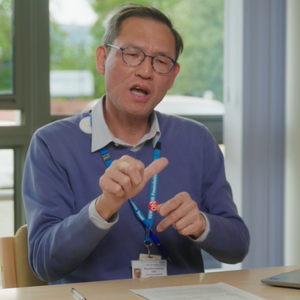
The North East Mental Health and Deafness Service, run by Cumbria, Northumberland, Tyne and Wear NHS Foundation Trust (CNTW), has produced two videos with members of the Deaf community to highlight the support available to them in a crisis.
Emmanuel Chan, a nurse in the Mental Health and Deafness Service, said: “It has been such a rewarding experience to co-create these informative videos with local Deaf people.
“These videos were created to provide information to the Deaf community in our region, in an accessible format, about what support is available if they find themselves in a mental health crisis.”
The longer video begins with information in British Sign Language about what we mean by a ‘mental health crisis’, and explains what support is available.
The shorter video focuses on ‘Ann’s story’, showing an example of what someone who is Deaf can expect from CNTW when they reach out for support.
The video features Anita, who played the part of a woman in distress seeking help, and nurse Emmanuel Chan. The longer video also features Conor signing the information. Both Conor and Anita are members of the Deaf community.
Anita said, “I am very pleased that I have been involved in the production of this video…It is very important for everyone to be aware of how to improve Deaf people’s access to services.” Conor added, “I would like to thank CNTW for allowing me to participate; it was very interesting and very nice to meet the other people involved.”
Deaf people are around twice as likely to experience mental health issues compared to the general population.[1] Mental health issues which are common in the deaf community include depression, anxiety and severe illnesses such as bipolar disorder and schizophrenia.
These difficulties are often made worse by the difficulty Deaf people can face when communicating with care providers. It is estimated there are more than 100,000 Deaf people within the UK whose first or preferred language is British Sign Language (BSL).
The Mental Health and Deafness Service was set up in the late 1990’s by pioneering nurse Joyce Pennington, who recognised the lack of services for Deaf people in the region who communicated using British Sign Language, and took it upon herself to lead the change. The team serves two large NHS trusts (CNTW and Tees, Esk and Wear Valleys NHS Foundation Trust). It is the only stand-alone community-based mental health service for Deaf people in England to have a dedicated consultant psychiatrist working with them. (You can read more here about how Joyce set up the service.)
Although the service mostly works with BSL users, they also accept referrals for people with acquired deafness who are struggling to access mainstream mental health services. Working with individuals and their support teams, the team can adapt communication, resources and information to promote accessibility and support staff to work with people in a meaningful and effective way.
There is also a handy wallet-sized card detailing these resources, as featured in the video. (Printed versions can be requested from the Patient Information Centre or Mental Health and Deafness Service.)
[1] Batten G, Oakes PM, Alexander T. Factors Associated With Social Interactions Between Deaf Children and Their Hearing Peers: A Systematic Literature Review. Journal of Deaf Studies and Deaf Education. 2014;19(3):285-302. doi:10.1093/deafed/ent052
